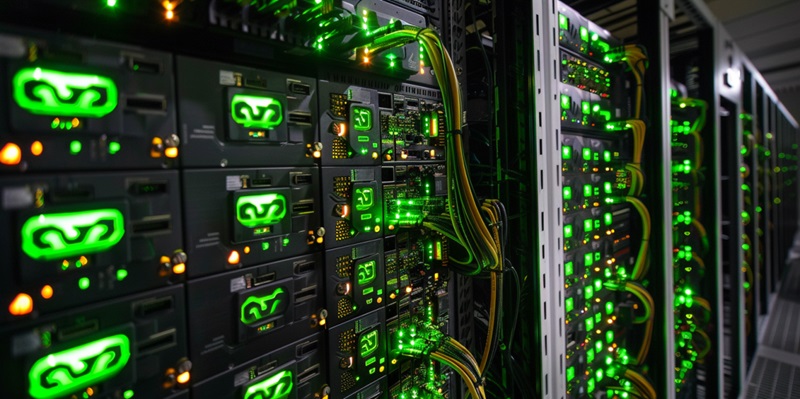The realm of artificial intelligence (AI) is rapidly evolving, driven by relentless technological advancements and substantial financial investments from major tech companies. One of the most ambitious projects that could potentially revolutionize AI training systems is reportedly in the pipeline. It involves the development of an AI cluster consisting of approximately 1.2 million GPUs, significantly eclipsing today’s most powerful supercomputers. Forrest Norrod, Vice President and General Manager of AMD’s data center business, shared this groundbreaking insight during a recent interview. This cluster represents a monumental leap forward, highlighting the escalating importance of AI infrastructure.
The Ambitious AI Cluster Project
Unprecedented Scalability and Investment
Forrest Norrod elaborated on a single-computer project of unprecedented scale that could redefine the AI training landscape. Companies are contemplating investments ranging from tens to even a hundred billion dollars for this ambitious endeavor. This underscores the significant financial commitment that players in the tech industry are willing to make to gain a competitive edge. For context, AMD’s Frontier supercomputer, powered by Epyc processors, currently holds the title of the world’s top-ranked supercomputer. The Frontier required around 600 million dollars and features 37,888 MI250X GPUs, making Norrod’s reveal of a potential project with 1.2 million GPUs almost unimaginable in scale and ambition.
Norrod’s interview also shed light on the strategic motives behind such massive investments. Companies are vying for technological supremacy, understanding that the future of AI hinges on superior hardware and software capabilities. High financial stakes come with equally high expectations for performance improvements, driving technological innovation at a pace never before seen. This trend underscores an era of AI where the capacity to process and analyze massive datasets is crucial for advancements in machine learning and other AI-related technologies. The AI cluster project, if realized, will mark a new chapter in the competitive landscape of AI and data processing.
AMD’s Strategic Competitive Positioning
In the ongoing AI arms race, one of the critical themes is AMD’s positioning against Nvidia, particularly in the GPU market. AMD has successfully captured 30% of the CPU market in data centers, showcasing its growing influence and competitive prowess. However, Norrod acknowledges Nvidia’s dominance, especially with its CUDA software ecosystem, which poses a significant hurdle to the widespread adoption of AMD’s GPUs. This dominance goes beyond hardware capabilities, encompassing a robust software framework that integrates seamlessly with Nvidia’s hardware.
Despite this, Norrod dismissed the notion of AMD merely replicating Nvidia’s hardware designs to compete. Instead, he hinted at AMD’s plans to explore innovative approaches to carve out its niche in the market. This strategic differentiation is essential as it allows AMD to leverage its strengths and capabilities in unique ways. Gartner Research supports this, noting that the adaptability and customization of AMD’s infrastructure can be a significant advantage in specialized applications. Innovation and strategic positioning will be crucial as AMD aims to scale its operations, potentially matching or exceeding Nvidia’s market presence.
The Broader Trends in AI Infrastructure
Escalating Financial Stakes and Rapid Advancements
The AI industry is witnessing a meteoric rise in financial investments and technological advancements as companies recognize the transformative potential of AI. The proposed AI cluster project is a testament to the trend towards developing more powerful AI training systems. High financial stakes are driving companies to innovate and push the boundaries of what is technologically possible. As AI models grow more complex, so does the need for advanced hardware capable of handling intensive computations.
The current trajectory suggests a future where AI capabilities are substantially enhanced, driven by robust GPU clusters and other specialized hardware. The industry’s focus is shifting towards creating infrastructure that can support massive training datasets, which are essential for developing sophisticated AI models. This shift not only involves scaling up hardware capabilities but also refining software frameworks to optimize performance and efficiency. The development of such infrastructure is expected to have significant implications for fields ranging from scientific research to commercial applications, redefining the boundaries of AI training and deployment.
Implications for the Future of AI
The field of artificial intelligence (AI) is advancing at an incredible pace, fueled by continuous technological breakthroughs and massive investments from major tech giants. One particularly ambitious project is set to potentially transform AI training methods. This initiative centers around the development of an AI cluster featuring roughly 1.2 million GPUs, far surpassing the capabilities of today’s most advanced supercomputers. Forrest Norrod, Vice President and General Manager of AMD’s data center business, revealed this groundbreaking development in a recent interview. Such an AI cluster signifies a substantial leap forward, emphasizing the growing significance of AI infrastructure. This monumental project not only underlines the heightened focus on AI within the tech industry but also serves as a testament to the burgeoning demands of complex AI models and applications. The anticipation surrounding this AI cluster suggests that we are on the cusp of a new era in AI, driven by unprecedented computational power and innovation.

